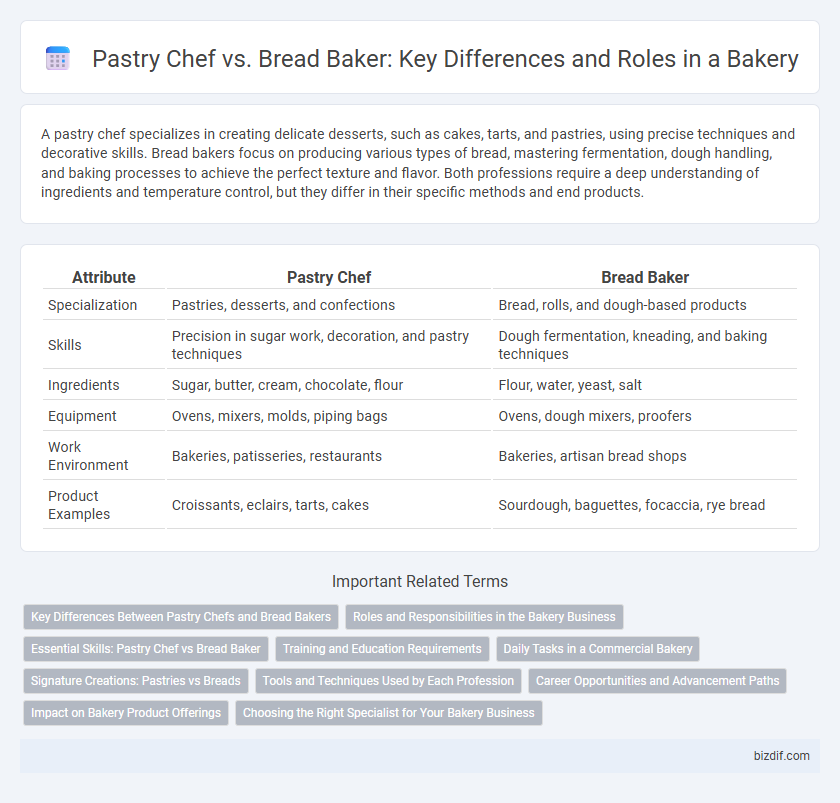A pastry chef specializes in creating delicate desserts, such as cakes, tarts, and pastries, using precise techniques and decorative skills. Bread bakers focus on producing various types of bread, mastering fermentation, dough handling, and baking processes to achieve the perfect texture and flavor. Both professions require a deep understanding of ingredients and temperature control, but they differ in their specific methods and end products.
Table of Comparison
| Attribute | Pastry Chef | Bread Baker |
|---|---|---|
| Specialization | Pastries, desserts, and confections | Bread, rolls, and dough-based products |
| Skills | Precision in sugar work, decoration, and pastry techniques | Dough fermentation, kneading, and baking techniques |
| Ingredients | Sugar, butter, cream, chocolate, flour | Flour, water, yeast, salt |
| Equipment | Ovens, mixers, molds, piping bags | Ovens, dough mixers, proofers |
| Work Environment | Bakeries, patisseries, restaurants | Bakeries, artisan bread shops |
| Product Examples | Croissants, eclairs, tarts, cakes | Sourdough, baguettes, focaccia, rye bread |
Key Differences Between Pastry Chefs and Bread Bakers
Pastry chefs specialize in creating delicate desserts, pastries, and intricate baked goods using precise techniques and a variety of ingredients like chocolate, creams, and custards. Bread bakers focus primarily on fermenting, kneading, and baking bread, mastering dough consistency, fermentation times, and oven temperatures to produce diverse types of bread. The key differences lie in the complexity of flavor profiles, ingredient handling, and final product textures, with pastry chefs leaning towards sweet, artistic creations and bread bakers emphasizing texture and crumb structure in savory or rustic loaves.
Roles and Responsibilities in the Bakery Business
Pastry chefs specialize in creating delicate desserts, pastries, and confections, focusing on artistic presentation and flavor complexity. Bread bakers primarily handle dough fermentation, kneading, and baking processes to produce various types of bread with consistent texture and taste. Both roles require mastery of baking techniques, but pastry chefs emphasize precision in sweetness and decoration, while bread bakers prioritize fermentation control and crust development.
Essential Skills: Pastry Chef vs Bread Baker
Pastry chefs excel in precision, artistic presentation, and a deep understanding of flavors and textures to create delicate desserts and pastries. Bread bakers possess expertise in yeast fermentation, dough kneading techniques, and temperature control critical for developing crust and crumb structure. Both roles require strong time management and consistency, but pastry chefs prioritize creativity and decoration, while bread bakers emphasize fermentation processes and dough handling.
Training and Education Requirements
Pastry chefs typically require formal culinary education with specialized training in pastries, desserts, and chocolate work, often completing programs at culinary schools or baking academies. Bread bakers generally gain expertise through apprenticeships or on-the-job training, mastering fermentation, dough handling, and baking techniques without mandatory formal degrees. Both professions benefit from understanding ingredient science, but pastry chefs emphasize precision and creativity, while bread bakers focus on the chemistry of yeast and gluten development.
Daily Tasks in a Commercial Bakery
Pastry chefs in a commercial bakery primarily focus on preparing and decorating delicate desserts, such as cakes, tarts, and croissants, requiring precision in techniques like laminating dough and working with icings. Bread bakers specialize in mixing, fermenting, shaping, and baking various types of bread, managing large-scale dough proofing and oven temperatures to achieve consistent crust and crumb quality. Both roles demand expertise in ingredient handling and time management to meet high-volume production schedules efficiently.
Signature Creations: Pastries vs Breads
Pastry chefs specialize in crafting delicate, intricate pastries such as eclairs, tarts, and croissants, often emphasizing decorative elements and refined flavors. Bread bakers focus on artisanal breads like sourdough, ciabatta, and baguettes, prioritizing crust texture, crumb structure, and fermentation techniques. Signature creations by pastry chefs showcase sweetness and visual artistry, while bread bakers highlight rustic craftsmanship and flavor depth.
Tools and Techniques Used by Each Profession
Pastry chefs rely on precision tools like piping bags, silicone molds, and tempering machines to create intricate desserts, while bread bakers favor heavy-duty mixers, steam-injected ovens, and dough scrapers essential for kneading and shaping dough. Techniques in pastry arts include tempering chocolate, laminating dough for croissants, and delicate icing methods, contrasting with bread baking methods such as fermentation control, scoring, and proofing to develop texture and flavor. Understanding the specialized equipment and skills highlights the distinct craftsmanship required in each baking profession.
Career Opportunities and Advancement Paths
Pastry chefs specialize in creating intricate desserts and pastries, often working in upscale restaurants, hotels, and boutique bakeries with opportunities to advance to executive pastry chef roles or open their own specialty shops. Bread bakers focus on crafting a variety of bread products, primarily in artisan bakeries or commercial baking facilities, with career progression leading to head baker, production manager, or bakery owner positions. Both career paths offer unique advancement routes driven by skill mastery, creativity, and business acumen within the diverse bakery industry.
Impact on Bakery Product Offerings
Pastry chefs specialize in creating delicate, sweet treats like cakes, tarts, and eclairs, enhancing a bakery's dessert variety and appeal. Bread bakers focus on artisanal breads and loaves, which contribute to the bakery's core staple selection and daily essentials. The collaboration between pastry chefs and bread bakers expands the bakery's product range, attracting diverse customer preferences and increasing overall sales potential.
Choosing the Right Specialist for Your Bakery Business
Selecting the right specialist for your bakery business depends on your product focus: a pastry chef excels in creating delicate, artistic desserts like tarts, croissants, and eclairs, bringing creativity and precision to sweet offerings. In contrast, a bread baker specializes in crafting a range of artisanal breads, mastering fermentation, dough handling, and baking techniques essential for hearty loaves and rolls. Understanding your bakery's niche and customer preferences ensures you hire the expert who will enhance product quality, operational efficiency, and overall brand reputation.
Pastry chef vs Bread baker Infographic

 bizdif.com
bizdif.com